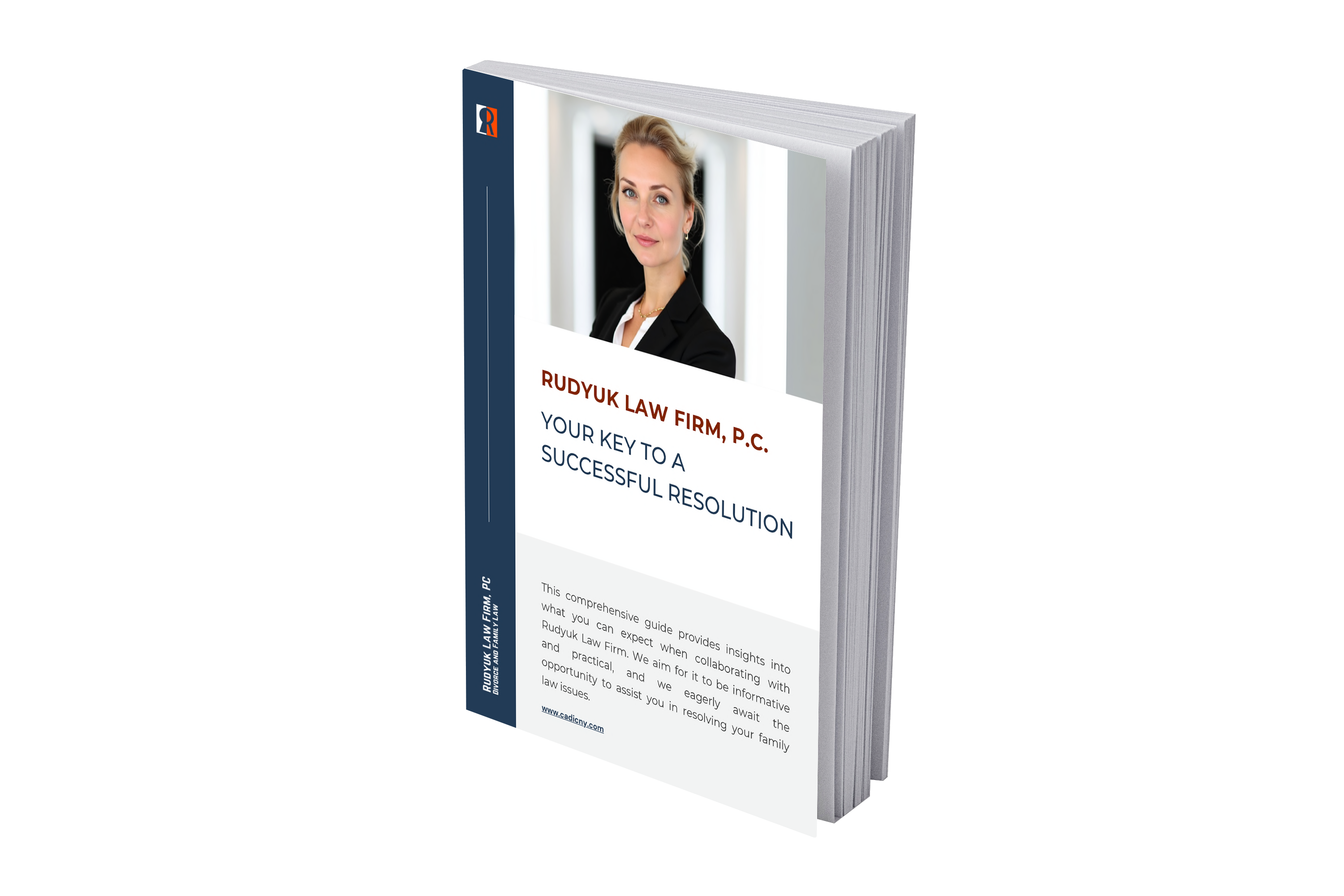Successful Resolution
Divorce, Annulment and Legal Separation
Most people enter into a marriage hoping that it will last, but nearly half of all marriages will result in a dissolution – a catchall term that includes divorce, annulment, and legal separation. When a marriage is at an end, it is essential to retain an experienced, knowledgeable attorney to help you (and your spouse) navigate these waters. Even the most amicable split can still have complex issues to resolve. Practicing in all aspects of family law, Ksenia Rudyuk, principal attorney of Rudyuk Law Firm, P.C., is an experienced divorce attorney in New York City, providing client-focused legal services to help resolve the issues surrounding the dissolution of marriage, from annulment or legal separation to uncontested and contested divorce, including more complex divorce proceedings, such as may be likely with high assets divorce cases and divorces involving children.
Divorce in New York
There are two types of divorce in New York: uncontested divorce and contested divorce. An uncontested divorce occurs when you and your spouse are able to agree that your marriage is over, with both of you consenting to the divorce, and are also able to agree on all of the resulting issues, such as child custody, child support, the division of property and other assets and debts, as well as other financial issues like spousal support.
If you need to resolve some or all of these issues, you may still be able to proceed with an uncontested divorce, but it may be in your best interests to retain the services of a knowledgeable divorce lawyer or mediator to help you reach mutually agreeable terms on the remaining issues in the divorce so that you can proceed to a resolution that ensures you and your rights are best protected.
Uncontested Divorce
If you are contemplating divorce and believe an uncontested divorce is right for you and your spouse, there are some initial steps you’ll need to take. First, at least one of the parties must swear in an affidavit that the marriage has been irretrievably broken for at least six months. Though there are seven grounds for divorce in New York, there is no requirement to assign fault to proceed with an uncontested divorce. Next, you need to meet the residency requirement – with some exceptions, either you or your spouse needs to have been living in New York State for at least one year immediately preceding the commencement of your divorce action if you were married in New York, and two years if you married in a different state or country.
Contested Divorce
A contested divorce in New York is a situation in which some aspect of the divorce – whether it’s custody, visitation, spousal maintenance, division of assets and debts (this list isn’t exhaustive) – is disputed by the parties and requires judicial intervention. An experienced attorney can help bring resolution to these outstanding issues in divorce, whether it’s through negotiating a settlement agreement or, if this is not possible, through litigation in court.
How to Get a Divorce in New York
If you believe you meet the residency requirement for divorce in New York State, and the marriage has been irreconcilable for at least six months – or you have other valid grounds for divorce – you can move forward with divorce proceedings by filing a Summons for Divorce or a Summons and Complaint.
Step 1: Preparation for Divorce
In New York, the Supreme Court rules on divorce, while Family Court rules on the subsequent issues of custody, child support, and other family-related issues after a divorce has been granted or if the parties were never legally married. Every county in New York has its own Supreme Court, and you must file for divorce with the matrimonial clerk’s office where either you or your spouse reside.
Step 2: Service of Divorce Summons
Once a divorce summons has been filed in New York, papers must be served on your spouse within 120 days of filing. These papers must typically be served by hand delivery, in person, by someone other than you. The time and location for serving divorce papers is flexible, although they cannot be served on Sunday. Divorce papers shall be served by a process server, or an alternative method of service if it is allowed by the court. An experienced attorney will assess your situation and advise you on how to proceed with the service of a divorce summons.
Step 3: Negotiating a Divorce Agreement
After the divorce papers have been served, the parties work out all aspects of the divorce, which include the division of property and debts, spousal maintenance, child support, child custody and visitation, and other related issues in a settlement agreement. Even in the most amicable dissolution of marriage, the parties usually find working with an attorney to be beneficial, as a knowledgeable attorney can help the parties to prepare a divorce settlement agreement that fully addresses all of their concerns. With a high assets divorce, there can be even more ground to cover, and even greater benefit to working with a reasonable divorce attorney to develop a comprehensive settlement agreement that will endure and prevent any future disagreements or disputes between the parties.
In a contested divorce, the parties will have to seek judicial intervention. The case will be put on a trial calendar, and the court will schedule conferences and then a hearing on the unresolved issues.
Often, a contested divorce will ultimately be resolved with a settlement agreement long before a trial – even if the divorce is difficult, the parties are often able to set their differences aside to negotiate such a settlement agreement. A reasonable attorney will work with their client to minimize time in the courts – but at the same time will be an aggressive advocate for their client’s interests.
Step 4: Getting a Divorce
Once all issues pertaining to the divorce are resolved and the divorce is approved, the judge or a referee will sign a formal document called the Judgment of Divorce, whereby the spouses will be officially divorced.
Annulment
If you wish to have a court in New York declare that your marriage is no longer valid, you can seek an annulment. To obtain a marriage annulment in New York State, you have to have a hearing before a judge. You will be required to prove that the marriage is no longer valid for one of the following five reasons:
- Too young to give consent to get married – If one of the spouses is under 18, their marriage requires the written consent of both parents of the minor. A spouse still under the age of 18 (or their parents/guardians) can seek an annulment of the marriage.
- Lack of mental capacity to give consent to get married – A marriage can be annulled on the grounds of incurable mental illness. It is possible that if a mentally ill spouse had been in a period of sound mind at the time of the marriage, the marriage will be upheld, but proof that one spouse was not of sound mind is grounds for annulment.
- Lack of physical capacity to consummate the marriage – If a spouse is physically unable to have sexual intercourse at the time of the marriage, and the other spouse is unaware at that time, the marriage may be annulled within the first five years.
- Consent for the marriage obtained by force, duress, or fraud – If one or both spouses entered into the marriage under false pretenses or through coercion or pressure, this can be grounds for annulment. Fraudulent marriages can include (but are not limited to) marriage to obtain legal immigration status, marriage that resulted from a false claim to be pregnant, or marriage through coercion by an abusive partner.
- Incurable mental illness for a period of five years or more – Even if a spouse was of sound mind at the time of the marriage, if that spouse has been mentally ill for at least five years afterward and cannot be cured, it may be possible to obtain an annulment.
Because seeking a marriage annulment in New York State requires a hearing and trial before a judge, retaining an experienced attorney to present your case for an annulment of marriage can be greatly beneficial.
Legal Separation in New York
Legal separation occurs when you and your spouse remain legally married but live apart, and voluntarily work out a formal written agreement that defines each spouse’s rights and responsibilities. Separation can be temporary while you work out marital issues, or permanent, in situations where the parties benefit from remaining legally married. Legal separation in New York can be accomplished with a written agreement between the parties.
There is no residency requirement for legal separation in New York, if you and your spouse are residents of New York State and the grounds for separation also arose in New York.
Otherwise, at least one of you must have been living in New York for two years before filing for separation, or one year if you (a) got married in New York, (b) lived in New York when you got married, or (c) the grounds for separation occurred in New York. (Only one of these conditions needs to be met.)
Since a separation agreement is a written contract, it is helpful to have an experienced attorney help you draft it. Both parties have to voluntarily consent to a separation agreement – the court will not impose a separation agreement in New York State.
Your Key to a Successful Resolution
If you’re contemplating divorce, annulment, or separation, contact Rudyuk Law Firm, P.C., today for a divorce consultation to explore your options. Ksenia Rudyuk, the principal, is an experienced and reasonable divorce attorney in New York skilled in helping clients resolve their divorce issues, and in getting results. Rudyuk Law Firm can be your key to a successful resolution.
Ksenia Rudyuk has been representing members of the Russian-speaking community in New York for many years, speaks Russian fluently, and knows Russian cultural influences.











